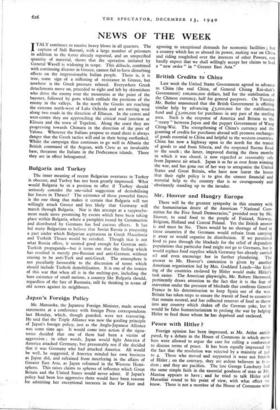Japan's Foreign Policy
Mr. Matsuoka, the Japanese Foreign Minister, made several statements at a conference with foreign Press correspondents last Monday, which, though guarded, were not reassuring. He said that the Triple Alliance was now the guiding principle of Japan's foreign policy, just as the Anglo-Japanese Affiance was some time ago. It would come into action if the signa- tories decided that one of them had been a victim of aggression ; in other words, Japan would fight America if America attacked Germany, but presumably not if she decided that it was Germany who had attacked America. All would be well, he suggested, if America minded her own business as Japan did, and refrained from interfering in the affairs of Greater East Asia, as Japan refrained in the Western Hemi- sphere. This raises claims to spheres of influence which Great Britain and the United States would never admit. If Japan's policy had been less aggressive there would have been reasons for admitting her exceptional interests in the Far East and agreeing to exceptional demands for economic facilities ; but a country which has so abused its power, making war on China and riding roughshod over the interests of other Powers, can hardly expect that we shall willingly accept her claims to lead a "new order" in "Greater East Asia."










































 Previous page
Previous page